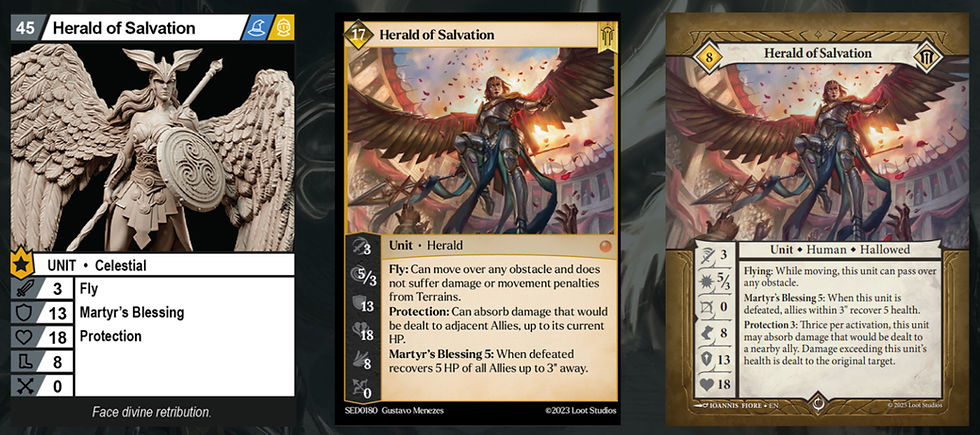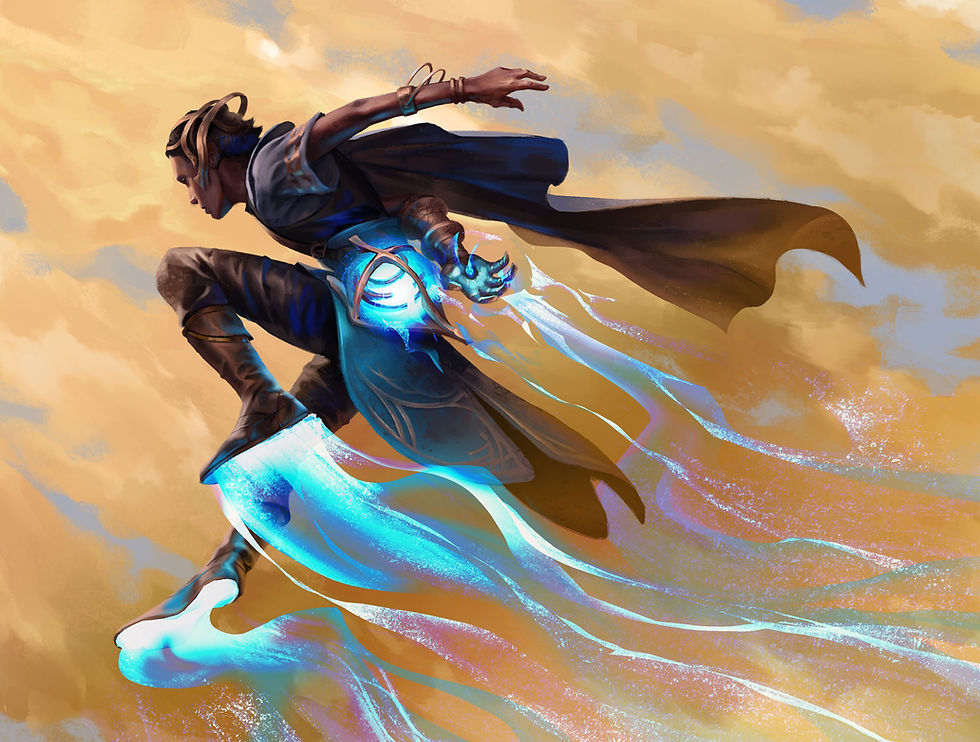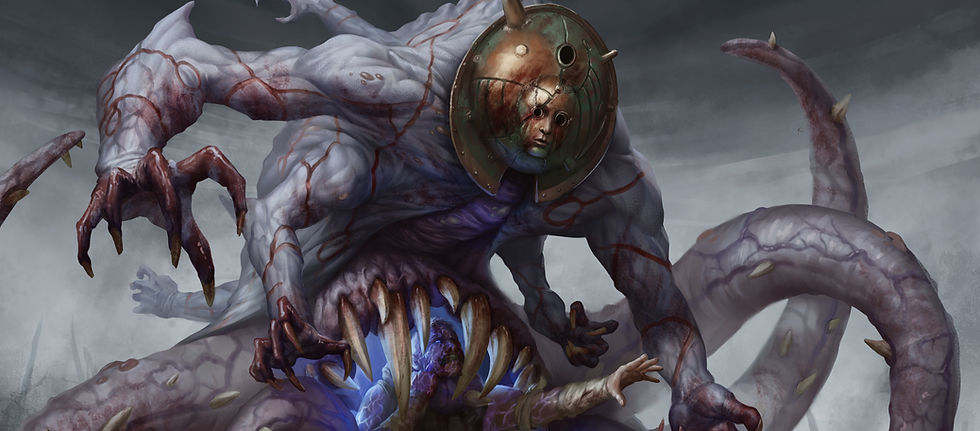Malediction - Coding For Human Processors
- Pettersen L.
- May 20, 2025
- 8 min read
Updated: 6 days ago

A while back, I gave a presentation on Malediction for the Digital Games course at PUC-Minas, my alma mater. This is a game that emerged from a deceptively simple desire, blending the depth of interactions and customization from competitive card games with the incredible models and physical aspects of a miniatures wargame. This came with the huge challenge of merging two game genres known for having elaborate rules, with wargames in particular being famous for their long gameplay sessions. The final product, however, was a passion project that has been getting a lot of praise at major board gaming conventions for being fast-paced and easy to learn without sacrificing depth.
Here is some of the feedback we've been getting.
For my presentation, I wanted to share with the students some decisions and strategies that I believed were paramount to getting these positive reactions while also approaching the subject in a funny way that interfaced with concepts from their programming classes. What I came up with was this weirdly named talk called Coding For Human Processors, which I have now decided to share with you in this post. I hope you enjoy it.
In the beginning, there were rules... A lot of them

While the early days of miniature gaming had a lot more going on, I like to picture a group of friends trying to bring their plastic toys to life by coming up with a list of rules on how they should behave. The more elaborate the situations taking place, the longer this list would get. This increase in complexity is often a result of trying to emulate reality through a set of instructions, and it is something that connects directly to the actual birth of wargaming as explored in a fantastic article by Professor Paul Schuurman that highlights how some of these games were trying to model real warfare at the sake of their playability.
The actual reason as to why creeping complexity takes such a toll on us, though, has a lot to do with how we learn and process information, a topic of great interest in the field of cognitive psychology, and one that often ends up in interesting comparisons between the human brain and computers. It shouldn't come as a surprise that so many board game designers with a digital games background like to compare writing rules to actual coding.
So what does a human processor look like?
In the Von Neumann architecture of a typical computer, data is stored in dedicated memory locations, with operations processed one at a time and scheduled according to a central clock. Our brains, on the other hand, are highly parallel systems that integrate memory and processing, storing information by strengthening neural connections linked to actions with positive outcomes.

While this may seem unreliable when trying to remember things, it is part of what makes us such incredible learning machines, as it means that we get better at things the more we do them. If that is the case, then what are we trying to optimize for when writing rules for humans?
Managing cognitive load
Be it the shape of a chess piece or the text on a card, all games communicate information somehow, and rules are our instructions to make sense of that. But unlike a computer spewing error logs and beeping when something goes wrong, humans can very much decide that the answer to 1+1 is "fish" and keep a game going, and what I mean by this is that we can be quite unpredictable when it comes to interpreting information.

Before our brains can commit what we learn to the back of our minds to the point of making performing tasks second nature, information needs to go through what cognitive psychologists call working memory, the processing power we are managing when writing instructions for humans. In the late 80s, Professor John Sweller coined the term cognitive load to describe the mental effort used as we learn something. This is basically how much we can ideally expect a user to remember about our games at once.
Throughout the development of Malediction, we've implemented a myriad of interesting solutions for creating an engaging and intuitive experience while doing our best to deal with cognitive load. Let's take a look at some of these solutions, shall we?
1- Reduce upfront information
I get that this one is somewhat tricky for a miniatures game, but if you want to have depth in your system while still keeping things beginner-friendly, figuring out solutions for reducing how much information players need to know upfront helps a lot. You can think of this pretty much like increasing the difficulty level as players get better at your game, a proven concept for adding depth that is as old as jumping on turtles' heads and getting magic mushrooms. Bottom line is, your game should ideally scale up in complexity, not down.
In nearly all miniature wargames that I got the chance to play, units already start on the board, meaning you are not only required to know all the rules for whatever you are bringing, but also the abilities for everything in your opponent's army. This can be somewhat intimidating, and it's something we've decided to do away with.

On Malediction, you deploy units by spending echo, a resource you gain in increasing amounts at every round. This helped us control how many units we wanted on the battlefield early on, while still allowing players to bring more stuff as the game progressed. By doing this, players only needed to worry about units' abilities as they came into play, breaking things down into more digestible chunks of information, which brings us to our next topic!
2 - Break down complicated problems
In his Master Class about mathematical thinking, Terrence Tao shares a valuable solution for tackling difficult problems: Breaking things down into simpler steps and solving one thing at a time. In wargames, players take turns either using all of their troops at once or one at a time, alternating with opponents.
We opted for the latter approach for reasons not related to cognitive load, like aiming for fair and more dynamic turns, but I do believe this to be a good way to also reduce how much stuff you need to think about at once. With alternate activations, the game becomes less tiring, and you can plan your actions as the round goes, seeing whatever your opponent is going to do and reacting accordingly.
3 - Simplify whenever possible!
A game system needs only to be as complex as necessary, and this applies even to something as simple as the numbers on the cards. We’ve started Malediction with some pretty large values to indicate the cost of our cards, and we justified that by convincing ourselves that those were placeholder values and that we needed the variance for balancing and steps like the initiative bid, where players lay down a card facedown and try to get the initiative based on the card's cost. At some point, I even coded an app to help players keep track of their resources, as they were taking too long thinking about how many units they could afford instead of deploying them into the battlefield.

Ultimately, we went with a cost that ranged from 1 to 10 and embraced the challenge of making everything else work as intended. Not only did the smaller numbers eliminate the need for the app, but they also provided a familiar and easy scale for players to gauge how strong a unit was.
4 - Tone down the tracking
Constantly asking players to remember steps they've taken takes a toll on working memory, and that is why it's often the case that there is no way around having components to track your resources. These components are a super powerful tool to avoid asking them to remember stuff, but should be reserved for things that are essential or largely prevalent in your game, as they come with an actual cost in plastic or paper to be manufactured.
For Malediction, we couldn't justify having tokens to keep track of unit states as a core mechanism for things like status effects or how many times you used an ability. Because of that, we made sure that whenever we needed players to remember something like how many action points they've spent, it would only be for the duration of a unit's turn, something short and easy to keep track of.
5 - Embrace abstraction
Action points, mastery, echo… These in-game resources and terms are all examples of abstract concepts for things we are trying to simulate. Chess is a fantastic example, where the movement of the pieces is all in favour of the strategy and fun of the game, and makes no sense as a realistic representation of warfare, but in wargames, the feeling of giving life to the character models is essential, meaning you have to decide what you want to simulate and what you can leave to the fantasy players create in their minds.

In Malediction, there was already a lot for players to focus on with the card interactions and unit abilities, so we did away with complex 3D physics and elaborate cover systems in favor of a more straightforward approach to movement, where obstacles simply blocked movement and line of sight.
6 - Build upon familiar concepts
We've established that humans are way better and faster at executing tasks once the concepts are familiar to us. This means that you can often get a head start by building upon ideas already familiar to your game's audience. On Malediction, our references were pretty obviously games like Magic: The Gathering, D&D, and Warhammer, and this sure helps a ton with cognitive load for any mechanics or even character archetypes reminiscent of those games, given how popular they are.
It is important to say that there is a downside to this, as you may end up having to jump through some hoops explaining concepts that remind people of something they've seen, but work differently in your game. In the end, references are just a starting point, so be sure to give extra attention to what makes your game special.
7- Give players a head start!

Regardless of how simple or complicated a game is, showcasing the mechanics on social media in small bits while also aiming to provide actual gameplay content through partners or as a marketing strategy is not only a great way to show confidence in your product and sell the fantasy of the game, it helps educate your audience so that they already jump into it with some background. Another good way to get players to the fun faster is to come up with a simplified, quick-play version of your game before you give them the full experience. This was very useful for us at events! I also cannot overstate how much an engaged community helps spread the word on how the rules work, making things super welcoming for newcomers.
Bottom line is... Let's aim for elegant solutions!
I could keep going on about things I appreciate on game systems or that I think we did well, but in the end, a lot of what we've discussed here are just strategies for handling complexity.

Stephen Hawking proposes that a model is elegant if it can solve complex problems without relying on too many arbitrary elements, and I truly believe the same can be applied to games. Let's try to boil this down to a simple mantra, shall we? A game system is elegant if it can solve complex problems in a simple way. I think our human processors would be happy with that.















Comments